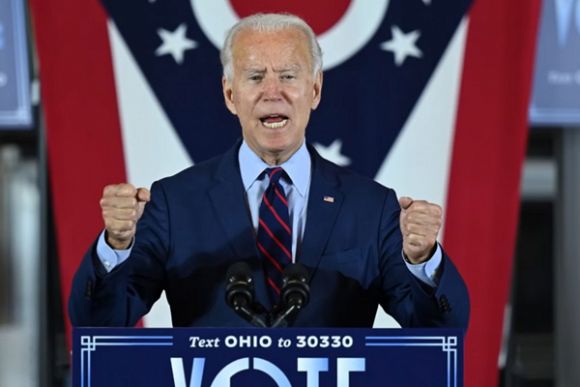Joe Biden’s win in the U.S. Presidential Election is part of a run of good news for the global climate.
Biden has promised to rejoin the Paris Agreement on his first day in office.
The U.S. will then be required to commit a Nationally Determined Contributions (NDCs) to reductions in carbon emissions. Biden has already announced that he is committed to achieving zero net emissions by 2050, along with an interim 2030 target will presumably be the basis of the US NDC.
Net-zero by 2050 is now the international norm. South Korea and Japan, both holdouts until relatively recently, announced commitments in October. Only a handful of OECD countries, including Australia, are now holding out. Middle-income countries with big emissions are also moving.
China set its target for 2060, which still implies a need for rapid action now and South Africa has expressed an aspiration for net-zero by 2050.
There are also more immediately positive developments. Bangladesh, the Philippines and Vietnam have all cancelled or greatly modified plans which involved a big expansion of coal-fired power. The same is true in Poland which has been, along with Turkey, the last big holdout.
One of the reasons for these moves is that it is now almost impossible to get finance for projects related to coal. The vast majority of both government and private lending agencies now have divestiture policies excluding, which are now being extended to cover the most destructive oil and gas projects, such as tar sands. There are still loopholes through which some coal projects can squeeze, but they are tightening all the time.
The final stage of the process is the withdrawal of big engineering companies from the business of building coal plants. General Electric announced this recently. Samsung and KEPCO, after taking a lot of reputational damage for involvement in the Vung Ang 2 project in Vietnam announced they wouldn’t be doing any more.
There’s still lots of work to be done. Getting to zero emissions by 2050 is a huge improvement on the scenarios that were being considered until recently, but not enough to prevent severe climate damage, some of which is already happening. An earlier decarbonization target and a shift to negative emissions are needed.
And targets are one thing, delivery another. China’s announcement won’t have much effect unless Xi Jinping can rein in provincial governments that are still eager to develop coal. And Biden probably won’t have much capacity to pass legislative action.
As the law stands at present, he can do a lot through executive action and regulation, but the Republican majority on the Supreme Court may try to stop this. But simply reversing actions taken by Trump would be sufficient.
Where does this leave Australia? Until now, climate policy has been driven almost entirely by domestic politics, in particular the climate denialism of the far right. But international pressure will be more significant from now on. It’s hard to see how the Morrison Government can continue to resist committing to a net-zero target for 2050. That, in turn, will entail decarbonization of electricity supply by 2035 at the latest, and possibly earlier.
Morrison is loudly declaiming that Australia will decide its climate policies, not other countries. In a sense that’s true. We can do our fair share, or we can shirk our responsibilities and wait for the consequences.
But, as one of the few national leaders clearly aligned with Donald Trump, Morrison ought to be aware that he can’t expect any favours from a Biden Administration. Biden has promised to tax imports from climate cheats and Australia will probably fall into that category,
A more immediate impact has arisen from the global swing away from thermal coal. The market price of high-grade thermal coal has fallen from $100 USD per tonne at the recent peak in 2018 (itself a big decline from the boom years 2010 and 2011) to around $60 USD per tonne today. At this price, few existing coal mines can operate profitably and prospects for new mines are dire.
The bizarre renaming of the Adani Group’s Australian mining operation, with the cod-Latin name Bravus, must be understood in this light. Coal is a shrinking part of Adani’s global operations. The Carmichael project, in particular, combines big reputational costs with little prospect of significant profits.
Adani must surely be considering the option of pulling the plug on the project, or at least of selling it off at a fire-sale price. The name change provides a little bit more distance between the Galilee Basin and the global operation.
After a decade of missed opportunities, the world finally seems to be ready to act on climate change. One way or another, if Australia fails to recognise this, we will all pay a price.
John Quiggin is Professor of Economics at the University of Queensland and the author of 'Zombie Economics and Economics in Two Lessons'. You can follow John on Twitter @JohnQuiggin.
Related Articles
- A Biden Presidency could be the final push for Australian energy policy
- NHS committing to net zero emissions by 2040, Australia should do the same
- Students should hold the Government to account over climate inaction
- The failure of our leaders to act on climate change is frustrating
- What's next for Labor on climate?
 This work is licensed under a Creative Commons Attribution-NonCommercial-NoDerivs 3.0 Australia License
This work is licensed under a Creative Commons Attribution-NonCommercial-NoDerivs 3.0 Australia License
Support independent journalism Subscribe to IA.
















